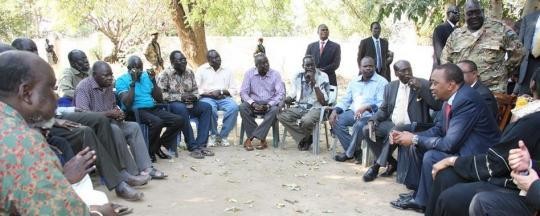Four of ‘the 11’ South Sudanese politicians detained by President Salva Kiir will face charges rather than be released, as had been requested by mediators of the peace talks in Addis Ababa.
Even after the signing of the Agreement on the Status of Detainees, the South Sudanese president has decided not to release four key opponents: Pag’an Amum Okeich, Majak D’Agoot, Oyai Deng Ajak and Ezekiel Lol Gatkuoth.
These four are all from Upper Nile and Jonglei states. Okiech, a Shilluk, served as secretary-general of the ruling party SPLM; D’Agoot, a Dinka, was deputy minister of defense; Oyai, also Shilluk, is ex-army chief of staff and ex-national security minister; and Gatkuoth, a Nuer, served for several years as head of the government liaison office in the United States.
Three others face treason charges in absentia: Riek Machar Teny, Taban Deng Gai and Alfred Lado Gore. “The three principle people we believe participated in the fight on the 15th and on the 16th, the three of them are all at large,” said the justice minister at a press conference late Tuesday, naming those just mentioned.
This group of seven – three at large and four detained – is accused of plotting a failed military coup. “These people have a case to answer before the court for planning and carrying out the coup,” said the minister.
Minister of Justice Paulino Wanawilla Onango said that another group of suspected politicians has been categorized separately. Seven of the detained politicians will be released to a neighboring country ‘for their safety.’
Those to be released are Deng Alor Kuol, Gier Chuang Along, Kosti Manibe, Cirino Hiteng, Madut Biar Yel, Peter Adwok Nyaba, and John Luk Jok. This group “were going to mobilize the public so that they can bring down the government,” said the minister.
He said that of this group “some of them actually have foretold or knew or participated in a place that they knew or they ought to have known that there was going to be a coup. Although they did not participate militarily they have actually conspired to bring about the coup. And this by itself, conspiracy to bring about the coup, per se under our law here is an offense.”
But he explained, “We don’t have enough evidence to prosecute them, we are going to make a conditioned release for them on bail. But it transpired that there is a concern for their safety. That when they are released and they are here in Juba at this time, their safety may be of concern to some people.”
“So one of the leaders of a neighboring country has pleaded with our president that he will be able to take them to his country so that they will be there,” he said.
Lastly, the minister said one other person detained, Khamis Abdellatif – who was not considered one of ‘the 11’ high-level detainees – is to be released immediately according to the recommendation of the investating committee.
“This guy was said to be a member of the group (of plotters), but on our investigating him, we discovered that he was not,” said the minister.
IGAD mediators have pledged to secure the release of the detainees before the start of the next round of peace talks in Addis Ababa, a member of the mediation committee Mohamed al Dabi told Radio Tamazuj last week. This comes as part of the Agreement on the States of Detainees, which was signed simultaneously with the ceasefire deal on Thursday.
The agreement itself stated only vaguely that the parties “are firmly committed to undertake every possible effort to expedite the release of the detainees.”
File photo: The Kenyan president and Ethiopian prime minister meeting with alleged coup plotters Oyai Deng, Gier Chuang, Kosti Manibe, Majak D’Agoot, Pagan Amum, Peter Adwok Nyaba, Chol Tong, Deng Alor, John Luk and others, 26 Dec. 2013 (BBC)
Radio Tamazuj thanks its listeners, website readers and supporters, especially those citizens, officials and civil society who continue to provide reliable information and feedback. Use the website contact form to send us a message.




